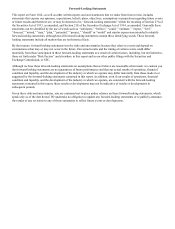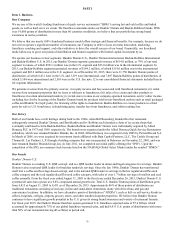Baskin Robbins 2015 Annual Report Download - page 18
Download and view the complete annual report
Please find page 18 of the 2015 Baskin Robbins annual report below. You can navigate through the pages in the report by either clicking on the pages listed below, or by using the keyword search tool below to find specific information within the annual report.-8-
International
Dunkin’ Donuts
International Dunkin’ Donuts franchisees are responsible for sourcing their own supplies, subject to compliance with our
standards. Most also produce their own donuts following the Dunkin’ Donuts brand’s approved processes. Franchisees in some
markets source donuts produced by a brand approved third party supplier. Franchisees are permitted to source coffee from a
number of coffee roasters approved by the brand, including the NDCP, as well as certain approved regional and local roasters.
In certain countries, our international franchisees source virtually everything locally within their market while in others our
international franchisees source most of their supplies from the NDCP. Where supplies are sourced locally, we help identify and
approve those suppliers. In addition, we assist our international franchisees in identifying regional and global suppliers with
the goal of leveraging the purchasing volume for pricing and product continuity advantages.
Baskin-Robbins
The Baskin-Robbins manufacturing network is comprised of eighteen facilities, none of which are owned or operated by us,
that supply our international markets with ice cream products. We utilize facilities owned by Dean Foods to produce ice cream
products which we purchase and distribute to many of our international markets. Certain international franchisees rely on third-
party-owned facilities to supply ice cream products to them, including facilities in Ireland and Canada. The Baskin-Robbins
brand restaurants in India and Russia are supported by master franchisee-owned facilities in those respective countries while
the restaurants in Japan and South Korea are supported by the joint venture-owned facilities located within each country.
Research and development
New product innovation is a critical component of our success. We believe the development of successful new products for
each brand attracts new customers, increases comparable store sales, and allows franchisees to expand into other dayparts. New
product research and development is located in a state-of-the-art facility at our headquarters in Canton, Massachusetts. The
facility includes a sensory lab, a quality assurance lab and a demonstration test kitchen. We rely on our internal culinary team,
which uses consumer research, to develop and test new products.
Operational support
Substantially all of our executive management, finance, marketing, legal, technology, human resources, and operations support
functions are conducted from our global headquarters in Canton, Massachusetts. In the United States, our franchise operations
for both brands are organized into regions, each of which is headed by a regional vice president and directors of operations
supported by field personnel who interact directly with the franchisees. Our international businesses are organized by region
and each brand has dedicated marketing and restaurant operations support teams that work with our master licensees and joint
venture partners to improve restaurant operations and restaurant-level economics. Management of a franchise restaurant is the
responsibility of the franchisee, who is trained in our techniques and is responsible for ensuring that the day-to-day operations
of the restaurant are in compliance with our operating standards. We have implemented a computer-based disaster recovery
program to address the possibility that a natural (or other form of) disaster may impact the information technology systems
located at our Canton, Massachusetts headquarters.
Regulatory matters
Domestic
We and our franchisees are subject to various federal, state, and local laws affecting the operation of our respective businesses,
including various health, sanitation, fire, and safety standards. In some jurisdictions our restaurants are required by law to
display nutritional information about our products. Each restaurant is subject to licensing and regulation by a number of
governmental authorities, which include zoning, health, safety, sanitation, building, and fire agencies in the jurisdiction in
which the restaurant is located. Franchisee-owned NDCP and CMLs are licensed and subject to similar regulations by federal,
state, and local governments.
We and our franchisees are also subject to the Fair Labor Standards Act and various other laws governing such matters as
minimum wage requirements, overtime and other working conditions, and citizenship requirements. A significant number of
food-service personnel employed by franchisees are paid at rates related to the federal minimum wage.
Our franchising activities are subject to the rules and regulations of the Federal Trade Commission (“FTC”) and various state
laws regulating the offer and sale of franchises. The FTC’s franchise rule and various state laws require that we furnish a
franchise disclosure document (“FDD”) containing certain information to prospective franchisees and a number of states
require registration of the FDD with state authorities. We are operating under exemptions from registration in several states
based on our experience and aggregate net worth. Substantive state laws that regulate the franchisor-franchisee relationship
























